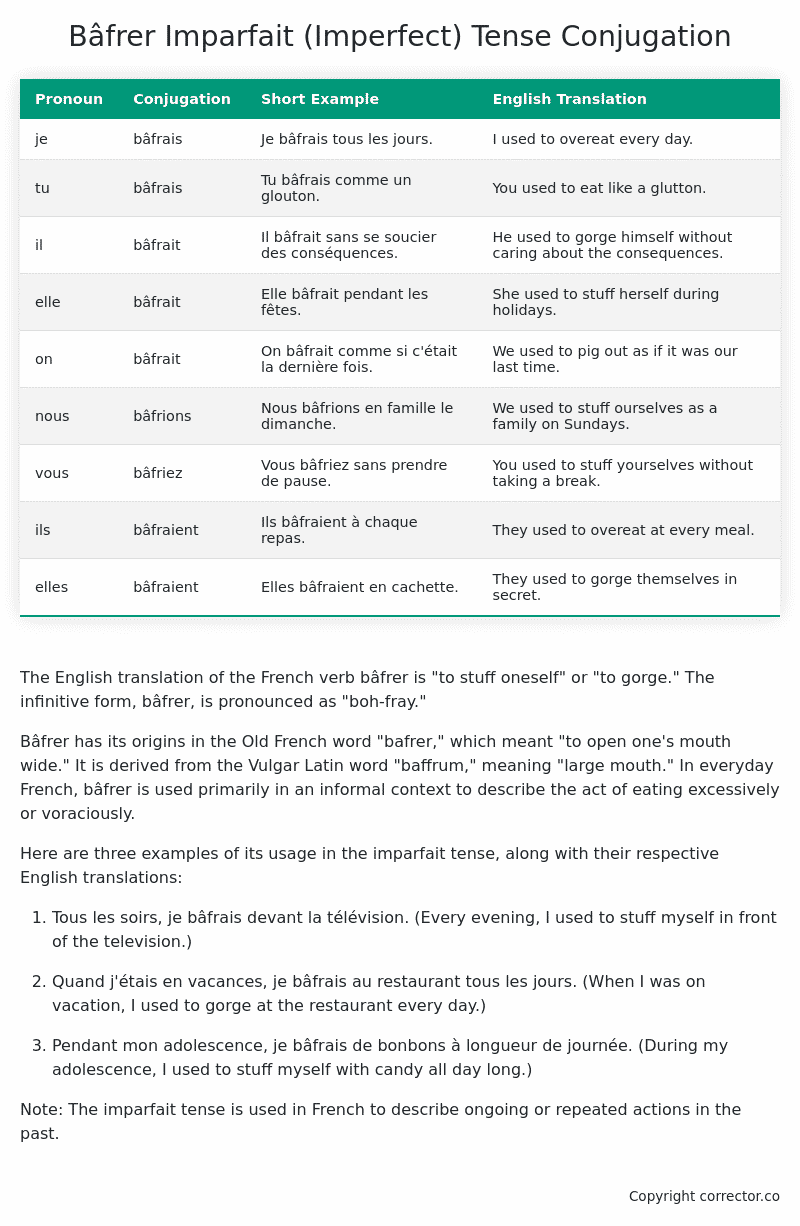Imparfait (Imperfect) Tense Conjugation of the French Verb bâfrer
Introduction to the verb bâfrer
The English translation of the French verb bâfrer is “to stuff oneself” or “to gorge.” The infinitive form, bâfrer, is pronounced as “boh-fray.”
Bâfrer has its origins in the Old French word “bafrer,” which meant “to open one’s mouth wide.” It is derived from the Vulgar Latin word “baffrum,” meaning “large mouth.” In everyday French, bâfrer is used primarily in an informal context to describe the act of eating excessively or voraciously.
Here are three examples of its usage in the imparfait tense, along with their respective English translations:
-
Tous les soirs, je bâfrais devant la télévision.
(Every evening, I used to stuff myself in front of the television.) -
Quand j’étais en vacances, je bâfrais au restaurant tous les jours.
(When I was on vacation, I used to gorge at the restaurant every day.) -
Pendant mon adolescence, je bâfrais de bonbons à longueur de journée.
(During my adolescence, I used to stuff myself with candy all day long.)
Note: The imparfait tense is used in French to describe ongoing or repeated actions in the past.
Table of the Imparfait (Imperfect) Tense Conjugation of bâfrer
| Pronoun | Conjugation | Short Example | English Translation |
|---|---|---|---|
| je | bâfrais | Je bâfrais tous les jours. | I used to overeat every day. |
| tu | bâfrais | Tu bâfrais comme un glouton. | You used to eat like a glutton. |
| il | bâfrait | Il bâfrait sans se soucier des conséquences. | He used to gorge himself without caring about the consequences. |
| elle | bâfrait | Elle bâfrait pendant les fêtes. | She used to stuff herself during holidays. |
| on | bâfrait | On bâfrait comme si c’était la dernière fois. | We used to pig out as if it was our last time. |
| nous | bâfrions | Nous bâfrions en famille le dimanche. | We used to stuff ourselves as a family on Sundays. |
| vous | bâfriez | Vous bâfriez sans prendre de pause. | You used to stuff yourselves without taking a break. |
| ils | bâfraient | Ils bâfraient à chaque repas. | They used to overeat at every meal. |
| elles | bâfraient | Elles bâfraient en cachette. | They used to gorge themselves in secret. |
Other Conjugations for Bâfrer.
Le Present (Present Tense) Conjugation of the French Verb bâfrer
Imparfait (Imperfect) Tense Conjugation of the French Verb bâfrer (You’re reading it right now!)
Passé Simple (Simple Past) Tense Conjugation of the French Verb bâfrer
Passé Composé (Present Perfect) Tense Conjugation of the French Verb bâfrer
Futur Simple (Simple Future) Tense Conjugation of the French Verb bâfrer
Futur Proche (Near Future) Tense Conjugation of the French Verb bâfrer
Plus-que-parfait (Pluperfect) Tense Conjugation of the French Verb bâfrer
Passé Antérieur (Past Anterior) Tense Conjugation of the French Verb bâfrer
Futur Antérieur (Future Anterior) Tense Conjugation of the French Verb bâfrer
Subjonctif Présent (Subjunctive Present) Tense Conjugation of the French Verb bâfrer
Subjonctif Passé (Subjunctive Past) Tense Conjugation of the French Verb bâfrer
Subjonctif Imparfait (Subjunctive Imperfect) Tense Conjugation of the French Verb bâfrer
Subjonctif Plus-que-parfait (Subjunctive Pluperfect) Tense Conjugation of the French Verb bâfrer
Conditionnel Présent (Conditional Present) Tense Conjugation of the French Verb bâfrer
Conditionnel Passé (Conditional Past) Tense Conjugation of the French Verb bâfrer
Conditionnel Passé II (Conditional Past II) Tense Conjugation of the French Verb bâfrer
L’impératif Présent (Imperative Present) Tense Conjugation of the French Verb bâfrer
L’impératif Passé (Imperative Past) Tense Conjugation of the French Verb bâfrer
L’infinitif Présent (Infinitive Present) Tense Conjugation of the French Verb bâfrer
L’infinitif Passé (Infinitive Past) Tense Conjugation of the French Verb bâfrer
Le Participe Présent (Present Participle) Tense Conjugation of the French Verb bâfrer
Le Participe Passé (Past Participle) Tense Conjugation of the French Verb bâfrer
Struggling with French verbs or the language in general? Why not use our free French Grammar Checker – no registration required!
Get a FREE Download Study Sheet of this Conjugation 🔥
Simply right click the image below, click “save image” and get your free reference for the bâfrer imparfait tense conjugation!

Bâfrer – About the French Imparfait Tense
NOTE: To take a deep dive into all the French tenses then see our article on Mastering French Tense Conjugation.
Formation of the Imparfait Tense
For regular -er verbs:
For regular -ir verbs
For regular -re verbs
Common Everyday Usage Patterns
Description of Past Habits
Background Information
Mental and Emotional States
It’s employed to express emotions, thoughts, or physical sensations in the past. For example: “J’étais content quand il est arrivé.” (I was happy when he arrived.)
Ongoing Actions
Points to Note About the Imparfait Tense
Passé Composé vs. Imparfait
Conditional
Si Clauses
Narration
I hope you enjoyed this article on the verb bâfrer. Still in a learning mood? Check out another TOTALLY random French verb imparfait conjugation!


